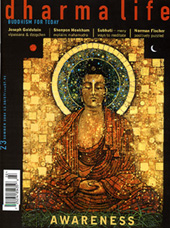Editorial: Awareness
According to the 19th-century American thinker Ralph Waldo Emerson, 'all true religion is spilled poetry'. What he meant was that the creeds, codes and institutions which come to define a religion have at their inception a powerful imagination. The great spiritual figures possess a wild, untameable visionary capacity, speak with 'tongues of fire', and use images, parables and myths that capture the minds of others. From the most powerful imaginations, entire civilisations can flow.
Take the Buddha. Just after his Awakening the Buddha had a vision of humanity as a bed of lotuses growing out of a pool. The lotuses were at various stages of unfoldment, some still buried in the mud, while others were about to burst into flower. That sense of human beings' potential is what encouraged the Buddha to teach.
This image was taken up by later Buddhist tradition - in the Lotus Sutra and in the iconography of Mahayana Bodhisattvas who sit upon lotuses that symbolise their unfoldment into Enlightenment. In this image Buddhism is perhaps saying to us: Imagine a flower. Imagine that this flower represents your life. And imagine that the meaning of your life lies in the flower coming fully into bloom ... It's an encouraging thought.
The theme of this issue of Dharma Life is awareness. Buddhism teaches various techniques for becoming more aware but, essential though such techniques are, they can come to feel artificial and unsatisfying if they are merely ways of 'doing something' to the mind. To balance Buddhist teachings that promote effort are those that encourage us simply to open up to the whole range of our present experience.
That opening up suggests a kind of experience that is the opposite of regarding the world as a problem to solve or a technique to master, or even a machine - the attitudes modern society encourages. Through such opening up we become more truly who we already are - a flower rather than a machine. And with awareness we experience life fully, without becoming attached or getting lost in particulars.
Most of our key contributors - Joseph Goldstein, Subhuti, Shenpen Hookham, Kamalashila and Norman Fischer - are experienced western Buddhists who all describe the surprising discoveries they have made along the way. Each of them suggests that the more they explore Buddhist practice the more mysterious life seems to become, and the less adequate are words, ideas and even teachings to describe it.
As Norman Fischer writes (Positively puzzled p.40), 'Spiritual truth is always bewildering, never entirely knowable. We can know some things. For a little while we can feel we know something that is true. Mostly we can be surprised by a feeling of wonder - or gratitude or gentle perplexity. But we never really possess the truth. My favourite line in the Zen ordination ceremony is 'The path is vast and wide. Not even a Buddha can define it'.'
Where concepts run out, images and poetry can still speak. So we have included poems by western Buddhist writers, such as Jane Hirschfield and Kenneth White, and meditation songs by Kalu Rimpoche and other masters of the Tibetan Shangpa lineage.
Perhaps the greatest of all Buddhist poets - and one of the major visionaries of Tibetan Buddhism - was the 11th-century Tibetan meditation master Milarepa. Like many people I am an admirer of Milarepa (from a suitably safe distance) and I especially love his words to a female disciple called Peldar Boom.
Milarepa told Peldar Boom to meditate on the sky, the mountain and the ocean. A while later she came back to say that she was progressing well, but there was a limitation. 'When I meditate on the sky I am distracted by the clouds; when I meditate on the mountain I am distracted by the trees; and when I meditate on the ocean I am distracted by the waves.' In his response Milarepa described an approach in which a meditation is also a kind of a poem:
Clouds are but manifestations of the sky,
So rest right in the sphere of the sky ...
Trees are but manifestations of the mountain,
So see them as the mountain itself ...
Waves are but the movement of the ocean
So dissolve yourself right in the ocean ...
The disturbing thought-flow manifests the mind
Therefore dissolve yourself into the very essence of mind.
Vishvapani



